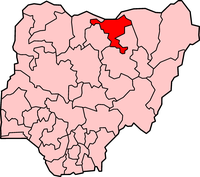Jigawa state is found in the North-West geopolitical zone of Nigeria. The state’s capital is in Dutse while other prominent towns include Birnin Kudu, Biyi, Kazaure, and Ringim. Jigawa state shares borders with Kano, Katsina, Bauchi, Yobe and Niger republic.
The predominant tribes include the Hausa, Fulani, Kanuri, and the Badawa. The population of Jigawa state is estimated at 4,348,647 inhabitants spread over 27 Local government areas and 77 development areas. Local government areas in Jigawa state include Auyo, Babura, Biriniwa, Birnin kudu, Buji, Dutse, Gagarawa, Garki, Gumel, Guri, Gwaram, Gwiwa, Hadejia, Jahun, Kafin Hausa, Kaugama, Kazaure, Maigatari, Malam Madori, Miga, Ringim, Roni, Sule Tankarkar, Taura, and Yankwashi. The major religion in Jigawa state is Islam.
Popular landmarks in Jigawa state include the Birnin Kudu rock paintings, the Hadejia wetlands, the Gwaram forest reserves, Wawan rafi lake Kazaure, Dutse Rock range, Emir's Palace Hadejia, Garin Gabas ancient settlement, Maitumbi Tomb Hadejia, Dabar Magini Bird's Sanctuary Guri, and the Harbo fishing village. Tertiary Institutions in Jigawa state include the Federal University Dutse, Jigawa state University Kafin Hausa, Federal Polytechnic Kazaure, Jigawa state College of education Gumel, Binyaminu Usman College of Agriculture Hadejia, Jigawa state Polytechnic Dutse, and the National Open University of Nigeria.
The Governor of Jigawa State is Badaru Abubakar.
The New World
Jigawa has a total area of 23,015 km squared with a topography characterized by undulating land and sand dunes. The vegetation is the Sudan Savannah with features of the Guinea Savannah foun in some parts of the state while there are notable rivers such as hadejia, kafin and Iggi. The average temperature in Jigawa is 35 degrees centigrade with annual precipitation at 1550 mm.
The Basement complex is found in the southern parts of Jigawa state while the northern parts consist of sedimentary rocks akin to those in the Chad formation. The Sudan savannah vegetation part of Jigawa state consists of expansive lands covered with lush green vegetation suitable for Animal grazing.
Inhabitants of Jigawa state engage in both Subsistence farming and Animal husbandry with over 70 percent of the state's population engaging in these economic activities. Commerce is also popular with a free trade zone established in the border town of Maigatari.
Other popular economic engagements of the people of Jigawa state include leather works, blacksmithing, dyeing of fabric and metal works. Trade is also a critical component of the economy of Jigawa state with the state hosting several markets such as the Maigatari international cattle market, Gujungu market Taura, Sara market, Kazaure grains market, Yankwashi central market, Hadejia market, Duhuwa market, Kazuba market, Balago market, Shuwarin market, and the Kujawa market.
A number of mineral resources are also found in Jigawa state and these include Kaolin, tourmaline, Amethyst, marl stones, Potash, Solice, Iron ore, Copper, gold, quartz, refractory clay, antimony, laterite clay, silica, talc, limestone, glass sand, and granite.
Jigawa state was created from Kano state in the year 1991. The state has had a number of governors/administrators which include
Olayinka Sule- 1991- 1992
Ali Saad Birnin Kudu - 1992- 1993
Ibrahim Aliyu - 1993- 1996
Rashhed Shekoni- 1996-1998
Abubakar Maimalari - 1998-1999
Ibrahim Turaki - 1999-2007
Sule Lamido- 2007-2015
Badaru Abubakar- 2015 to date.
4 based on 0 reviews

Find and explore some of the best businesses in Jigawa State.
© 2025 Manpower Nigeria. All rights reserved.